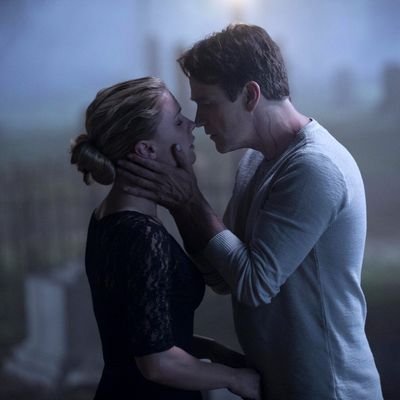
ÔÇ£TV shows are hardÔÇØ is how┬áTrue Blood┬áshowrunner Brian Buckner begins his explanation of the difficulties inherent in writing a series finale, and from the sound of it, thatÔÇÖs an understatement. Could there have been a more complicated and thankless task than concluding a show like┬áTrue Blood, with its wildly disparate story lines, characters, and tones, not to mention its┬ásliiightly┬ápassionate fanbase? And thatÔÇÖs to say nothing of the undeserved backlash itÔÇÖs had to deal with these last few seasons. So if Buckner sounds a bit beleaguered the morning after his divisive series finale, ÔÇ£Thank You,ÔÇØ closed the coffin on a seven-year legacy, itÔÇÖs for pretty good reason. ÔÇ£IÔÇÖve done a little bit of reading today.ÔÇØ
In addition to explaining that actor scheduling prevented certain characters from sharing screentime (think Eric and PamÔÇÖs often-isolated scenes from the rest of the show) to the intentionally unimportant identity of SookieÔÇÖs husband (ÔÇ£This [mystery] is not on the level of The Sopranos finaleÔÇØ), Buckner also brought clarity to his rationale behind certain other creative decisions. For example, I asked whether he saw a conflict in presenting vampirism as a gay allegory only to then have the romantic lead opt to commit suicide rather than live as one, and he had this to say:
ÔÇ£IÔÇÖve done some thinking about this one. What I will say to that is yes, True Blood is an allegory about otherness, but when you read a novel that is allegorical, itÔÇÖs usually about one character. To maintain allegorical correctness across the board with 20 characters is sometimes impossible. You have to pick a center. So, for us in this story line, I think itÔÇÖs obvious from the seven years that Sookie and Bill were not meant to be [in] true love forever. So now youÔÇÖve got to pick whose otherness youÔÇÖre going to protect. I think the allegory to be protected was SookieÔÇÖs. So we chose to call her the center of our story. WeÔÇÖve got a show that was based on The Sookie Stackhouse Novels, and her otherness and her specialness was the thing that we chose to protect. So thatÔÇÖs how I reconcile it. You canÔÇÖt have a show without a center, and the allegory can spread out in all directions from there. But I donÔÇÖt think itÔÇÖs a show where Bill is No. 1 on the call sheet. And I donÔÇÖt think itÔÇÖs a show where Eric is No. 1 on the call sheet. So thatÔÇÖs how I would defend it.ÔÇØ
When asked whether BillÔÇÖs ultimate suicide made him heroic or (in my admittedly wishful-thinking theory) subversively villainous, Buckner held strong on that front as well:
ÔÇ£What Bill came around to was similar to what Godric came around to, which is that a human life is extraordinary, too. And we kept hitting this point through different charactersÔÇÖ mouths. Gran told Sookie in a flashback that you can have any kind of life you want, but these are the things that matter. That having children and the natural cycle of life is beautiful in and of itself, and that death gives life meaning.
ÔÇ£HereÔÇÖs what I think the confusion is: Sookie has been asking for a normal life. To be normal. She has felt conflicted, but also empowered, with her power. So I donÔÇÖt think Bill was being a crap-weasel for suggesting to Sookie, ÔÇÿUse your light.ÔÇÖ I donÔÇÖt think it was weak, I donÔÇÖt think it was, If I canÔÇÖt have you, no vampire can have you. I donÔÇÖt think it was any of those things. I do believe it was heroic. So thatÔÇÖs the thinking. So, yes, I think he was meant to be heroic, and I am not confused by it, but he is certainly made more complex, and it is ultimately SookieÔÇÖs story, not a Bill story.ÔÇØ
In the end, it all came back to how difficult it was to navigate all these narratives while keeping an already divided fanbase happy, a sprawling cast engaged, and HBO executives appeased, and on that front, Buckner remains rightfully proud of his landing:
ÔÇ£It might be fun to do the last season over again. But you make choices. IÔÇÖm sure it could be told a different way. But we canÔÇÖt break stories from fear of how people are going to be disappointed. And the show had to end somehow. So IÔÇÖm sort of defiantly proud of what we did, with the understanding that you canÔÇÖt please everyone. You just canÔÇÖt.ÔÇØ

